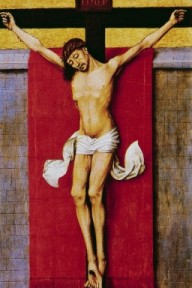| Villages
organized by Jesuits to evangelize Native Americans, but destroyed
by Portuguese and Spanish settlers. |
 |
|
"Christ
on the Cross"
by Roger van der Weyden
|
Missionaries in
Latin America were often in conflict with settlers, because the settlers
wanted to enslave the native peoples and the missionaries opposed this.
Members of the Society
of Jesus therefore decided to pursue missions in very remote areas
where Europeans had not yet penetrated. Native American villages were
organized into towns, each with its own church, plaza, living quarters,
and workshops. These missions were tightly controlled by the Jesuits,
who sought to transform the life of native peoples. By 173l an estimated
140,000 people lived in these villages. Native Americans who rejected
the Jesuit program sometimes attacked the villages, but the worst opposition
came from Portuguese and Spanish settlers, who sought to destroy the missions.
Failing to drive the Jesuits away from the villages, the settlers then
accused the Jesuits of forming an independent state. These charges added
to the pressure for Jesuit reductions.
In 1667 all Jesuits were ordered to leave Spanish territories. Soon Spanish
and Portuguese slave hunters destroyed the villages and captured and sold
many of the people.
|